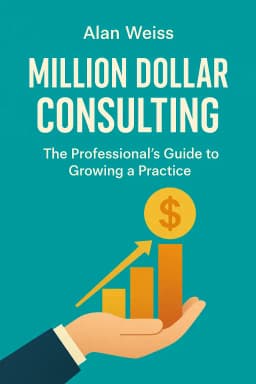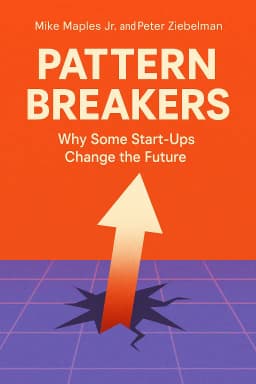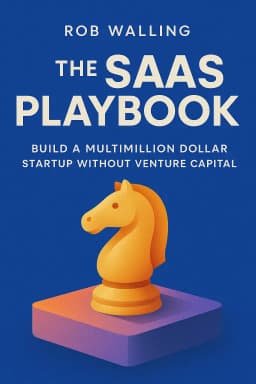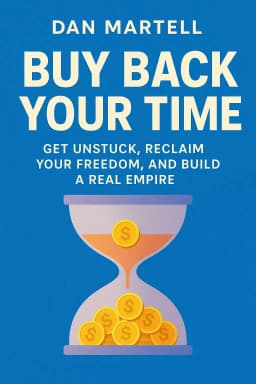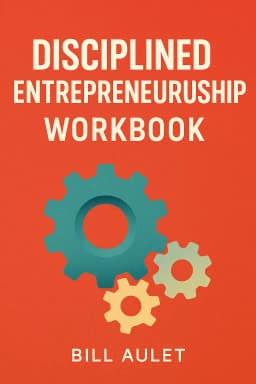
Math Before Magic
Golden Hook & Introduction
SECTION
Michelle: Alright, Mark, I have a confession. I think 'follow your passion' is the worst career advice ever given. It sounds like a recipe for becoming a broke, but very passionate, artist. And I think today's book agrees with me. Mark: It absolutely does. We're diving into the Disciplined Entrepreneurship Workbook by Bill Aulet. And Aulet, who’s the managing director for entrepreneurship at MIT, basically built his career on turning that passionate, chaotic art into a teachable science. He's seen hundreds of startups, and his whole point is that discipline, not just passion, is what separates the winners from the failures. Michelle: An MIT professor trying to put rules on the beautiful chaos of creation. I'm both intrigued and deeply skeptical. It feels like trying to write a symphony using a calculus textbook. Mark: That’s the perfect way to put it. And that’s the tension we’re exploring today. Aulet argues that without a strong, logical foundation, your beautiful symphony will never find an audience willing to pay for a ticket. His work is highly rated, but some readers do find it almost too methodical, which is a fair point. It’s not a book about visionary inspiration; it’s a book about execution. Michelle: Okay, execution I can get behind. So where does this disciplined journey begin? Not with a brilliant, world-changing idea, I presume? Mark: Not even close. It begins with something far less glamorous, but infinitely more important: finding someone who will actually pay you.
The Anti-Passion Play: Finding Your Customer Before Your Product
SECTION
Mark: The very first steps in Aulet's 24-step framework are all about market segmentation. Before you write a single line of code or design a logo, you have to answer the question: Who is your customer? And not in a vague, "we're targeting millennials" kind of way. He wants you to get hyper-specific. Michelle: This is where my skepticism kicks in. Every startup book says "know your customer." How is this different? Mark: It's the sheer, relentless focus he demands. He introduces this powerful concept called the "Beachhead Market." He borrows the term directly from military strategy, specifically the D-Day invasion of Normandy. Michelle: Whoa, okay. That's a dramatic analogy for selling software. Mark: It is, but it’s perfect. The Allied forces didn't try to invade all of Europe at once. That would have been a disaster. They concentrated all their power on a tiny strip of beach in Normandy. They took that beach, secured it, and only then, from that position of strength, did they expand. Aulet says startups must do the same. Michelle: So, find one small, very specific market and win it completely before even thinking about anything else? Mark: Exactly. Think about Facebook. It didn't launch to the world. It launched to a single, tiny, and incredibly dense beachhead: Harvard University students. The end users all bought the "product" the same way, they all talked to each other, and they all had the same needs. Facebook dominated that beach, then expanded to other Ivy League schools, then all colleges, and only then, years later, the world. Michelle: Okay, the Facebook example is powerful. But for a new founder with a great idea and no money, that level of focus feels terrifying. What if you pick the wrong beach? You've just wasted all your time and resources on a dead end. Mark: That’s the perfect question, and it leads directly to the next layer of discipline: Step 5, Profile the Persona. This isn't just a generic marketing avatar. Aulet insists you find one real, actual human being who perfectly represents your beachhead market. You learn their name, their job, their fears, their daily routine, what keeps them up at night. Michelle: One single person? That seems even more narrow. Mark: It’s about making the abstract real. It stops the founding team from debating features in a vacuum. Instead, the question becomes, "Would our Persona, let's call her 'Designer Dana,' actually use this? Does this solve her number one problem?" The book points out that politicians do this masterfully. They don't campaign to "the American people"; they craft every message to resonate with a very specific "end voter" profile. Michelle: Huh. So the Persona becomes a tie-breaker. A North Star for every decision. Mark: Precisely. It keeps the main thing the main thing. Your job isn't to build a cool product; it's to build a product that Designer Dana is so desperate for, she's willing to pay for it. You're not just walking in her shoes; you're mapping her entire workflow, what the book calls the Full Life Cycle Use Case. You need to understand her world better than she does. Michelle: That’s a high bar. It sounds less like being an innovator and more like being an anthropologist. Mark: It is! And that's the point. The innovation comes in the solution, but the problem has to be grounded in deep, almost obsessive, human reality. You can't just have passion for your idea; you have to develop a passion for your Persona's problem. Michelle: Okay, I'm starting to see the 'discipline' part. It's the discipline to resist the temptation to build your own cool thing and instead do the hard work of customer research first. So, let's say you've done it. You've found your beachhead, you're obsessed with your Persona... now you're finally ready to build the world-changing product, right? Mark: Not yet. Now comes the part that most startups ignore until it's too late. The part that determines whether you have a business or just an expensive hobby. Michelle: Oh boy. I have a feeling this is where the math comes in. Mark: This is exactly where the math comes in.
The Unsexy Math of Startup Survival: LTV > COCA
SECTION
Mark: After you've defined your customer and what you can do for them, Aulet forces you to confront the cold, hard economics of your venture. He boils it down to two critical, and often misunderstood, metrics: LTV and COCA. Michelle: Okay, acronym alert. Break those down for me. Mark: LTV is the Lifetime Value of an Acquired Customer. In simple terms, it's the total profit you'll make from one customer over the entire time they stay with you. COCA is the Cost of Customer Acquisition. That's the total amount of sales and marketing money you spend to get that one customer in the door. Michelle: LTV and COCA. Got it. So what's the magic number? Mark: The golden rule, according to Aulet and many venture capitalists, is that your LTV needs to be at least three times your COCA. LTV should be greater than 3x COCA. Michelle: Three to one. Why that specific ratio? Mark: Because the difference doesn't all go into your pocket. That margin has to pay for all your other costs—product development, rent, salaries, all the general and administrative stuff. If your ratio is less than 3:1, you're likely burning cash to acquire customers who will never pay you back enough to be profitable. You're essentially paying people to use your product. Michelle: That sounds like a terrible business model. But again, this feels like something you'd figure out way down the line, once you have real sales data. Why is Aulet making you do this so early? Mark: Because it forces you to be intellectually honest from day one. It stops you from pursuing an idea that is fundamentally broken. The book has this great implicit example that illustrates this perfectly: the Pet Rock. Michelle: The Pet Rock! From the 70s? The rock in a box? Mark: The very same. The Pet Rock had a fantastic, almost zero, COCA. It went viral through word-of-mouth. It was a marketing phenomenon. But what was its LTV? Michelle: Well, you buy it once... and that's it. It's a rock. So the LTV is just the profit from that one sale. Mark: Exactly. The LTV was tiny, and there was no recurring revenue. No ecosystem. No upsell. It was a fad, not a sustainable business. Now contrast that with a company like Dollar Shave Club. Their initial COCA was probably pretty high—they had to produce that famous viral video and spend a lot to get their first subscribers. Michelle: Right, but once you're a subscriber, you're paying them every month. Mark: And that's the key. Their LTV is massive because of that recurring revenue. They could afford a high initial COCA because they knew, mathematically, that each customer would pay for themselves many times over. The math worked. For the Pet Rock, the math was a dead end. Michelle: That makes so much sense. It’s not just about getting customers; it’s about getting customers profitably. And you can't know if it's profitable without estimating both sides of that equation. Mark: And this is where the business model design comes in. Step 15 is all about choosing how you get paid. Is it a one-time fee? A subscription? A usage-based model? Each choice dramatically changes your LTV. Aulet says entrepreneurs often confuse pricing with business model. Pricing is how much you charge. The business model is the mechanism by which you capture value. And you have to design that mechanism to ensure your LTV will eventually dwarf your COCA. Michelle: It’s a bit of a reality check. Your idea might be brilliant, your product might be beloved, but if you can't find a business model where LTV is three times COCA, you don't have a company. Mark: You have a charity. Or a very popular, money-losing art project. And Aulet's whole mission is to save entrepreneurs from that fate.
Synthesis & Takeaways
SECTION
Michelle: Okay, so when you strip it all down, this "disciplined" approach really seems to boil down to two core, non-negotiable pillars. Mark: I think that's a perfect summary. What are they? Michelle: First, there's the discipline of focus. The almost fanatical commitment to finding a single, tiny beachhead market and a single, real-life Persona, and then learning everything about them. It's about resisting the urge to be everything to everyone. Mark: The Anti-Passion Play, as you called it. Passion for the customer's problem, not just your solution. Michelle: Exactly. And second, there's the discipline of reality. The willingness to confront the brutal, unsexy math of the business. To honestly calculate your LTV and COCA and admit, early on, if the numbers just don't work. One without the other is useless. A great business model with no real customer problem is a ghost. A great solution to a real problem with a broken business model is a tragedy. Mark: That’s it. And you can see why Aulet's work, while widely acclaimed, gets some criticism for being so methodical. It can feel like it drains the romance out of the startup journey. But I think that's a misreading. Michelle: How so? Mark: It’s not about killing creativity or passion. It's a framework for de-risking your dream. It's about channeling your passion and creativity toward a problem that the market will actually reward you for solving. Entrepreneurship is incredibly hard. The odds are stacked against you. This framework is a tool to systematically shift those odds, even just a little, in your favor. It’s about building a solid foundation of discipline so that your passion has a place to stand and build from. Michelle: A foundation, not a cage. I like that. It’s a roadmap to make sure your passion project doesn't become a passion pit of debt and failure. Mark: Well said. It's a guide to help you build something that lasts. Michelle: For anyone listening who has a startup idea buzzing in their head, maybe the first step isn't to go design a logo or code a prototype. Maybe it's to take a page from Aulet's book and do Step 1: just brainstorm a list of 20 potential types of customers who might have the problem you want to solve. A fascinating, and I imagine, very humbling exercise. Let us know what you discover. Mark: This is Aibrary, signing off.

